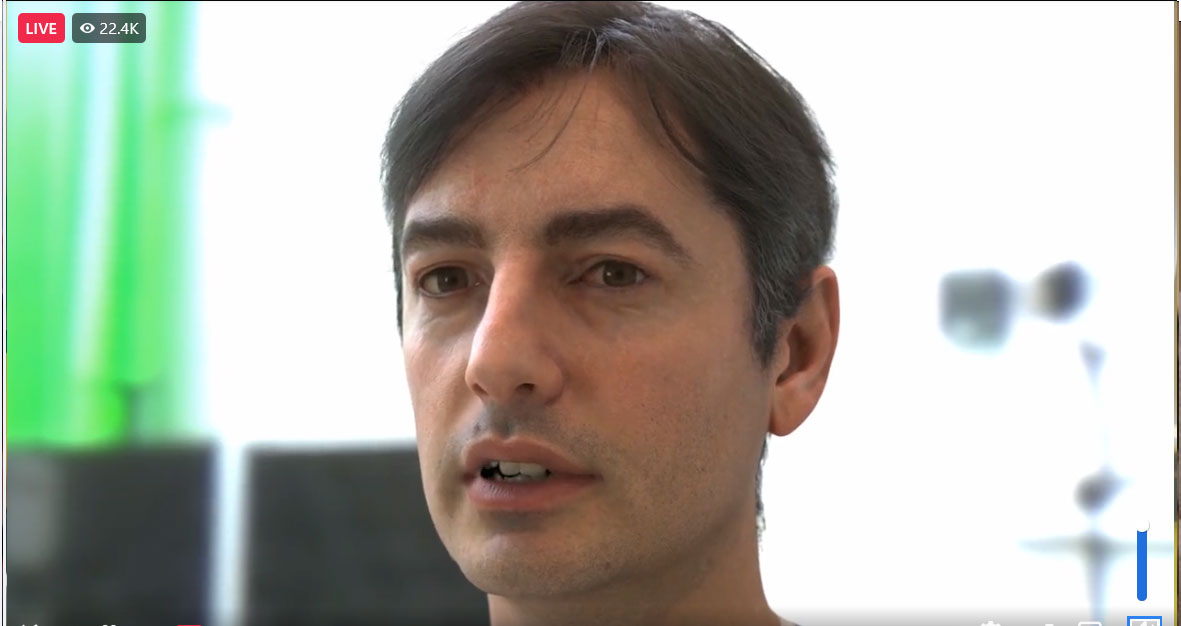The XR Week Peek (2021.10.31): Facebook becomes Meta, Pimax teases Reality headset, and more!
Hello everyone and Happy Halloween to whoever celebrates it! Here in Italy we were not used to celebrating it when I was a kid, but children now have fun dressing up and asking for some sweeties from their neighbors. As the ghost of VR, I guess it should be my favorite festivity, so it’s my time to go outside and scare people by saying sentences like “Cardboard is back!”

But today I have something more to celebrate… I have reached 20K followers on Twitter! I still can’t believe this… some years ago I even thought 10K was an impossible target for me… in the end, I’m just a guy writing technical walls of text, publishing badly edited Youtube videos, and making jokes about porn in VR… but here I am with 20,000 written next to the count of my followers. I don’t know how I got here, I still feel like when I had one thousand… but I’m incredibly happy about it… and I know that it has all been possible only thanks to the amazing people of the XR community that have always been very supportive and helpful. I don’t have followers, I have friends, supporters, and mentors… and I’m glad to have met so many fantastic people during my journey in immersive realities. Thank you all… grazie mille, gracias, merci, danke, 谢谢 20,000 times!
Top news of the week

Facebook becomes Meta
Facebook Connect, the most awaited VR event of 2021, happened, and it was not as we expected it to be. Most of us were expecting the launch of the Quest 2 Pro, a discount on the original Quest, and the official release of Horizon Worlds, but nothing of this happened. The whole event was all about Facebook creating a parent company called Meta that is going to control all the products that until now were in the Facebook’s family, that is Facebook, Instagram, Whatsapp, Oculus, Portal, and all the rest. Zuck has explained what is the metaverse and what is its potential, and what role Facebook wants to have in it, that is being the platform used by the creators. It wants to be one of the leaders of the metaverse and wants to take a transaction fee on everything that is happening in the future creators’ economy… something that may be worth many billions of dollars. Of course, he’s not going to abandon ads, so Meta will still also be about data collection.
The news made headlines on all the most important magazines of the world, and many people that weren’t even aware of XR now have got to know that the mission of one of the most important companies in the world is to build “the metaverse”. For sure this will increment awareness towards XR and will give even more momentum to all our ecosystem.
Apart from this, we had a few important announcements, like for instance:
- GTA San Andreas coming to Quest 2
- Project Cambria: a hybrid AR/VR headset arriving next year. It is the headset of the leak that we believed to be the Quest 2 Pro, but Zuck said that it won’t be a Quest
- Project Nazare: an AR headset that Facebook is building and that plans to release when it will be small enough to please the average consumer
- More powerful AR tools, Voice SDK and Interaction SDK coming for Quest 2 developers in the next months
- 2D apps and WebXR apps coming to the Quest Store
Then, as usual, John Carmack made his amazing unscripted talk where he detailed how building the “metaverse” is not a matter of doing some kind of high-level dream, but it is a very practical problem of understanding how to actually implement the building blocks of it by optimizing and overcoming the limitations of current technology. 1 hour of a standing ovation for having highlighted this.
(PS This summary is very short because tomorrow I will publish another post with a summary dedicated only to the Facebook Connect… stay tuned not to miss it!)
More info (Summary of the news announced at Facebook Connect 2)
More info (John Carmack talking about the metaverse)
More info (My editorial on Facebook Connect 2)
Other relevant news

Pimax announces Reality, the headset of our dreams
Chinese company Pimax has announced Reality, a headset that includes everything we have always wanted in a VR headset. They have teased the following features:
- Standalone + tethered PCVR possible modes
- 12K display
- 200Hz refresh rate
- 240° diagonal FOV
- Snapdragon XR2 chipset for standalone mode
- Inside out tracking with optional SteamVR faceplate
- Eye and face tracking sensors
- Integrated full-body tracking
- Additional modules made by 3rd parties like one integrating a scent emitter
It also announced Pimax VR Station, which is described as a “console dedicated to playing VR”: it should be a dedicated computer to play VR games with Pimax headsets.
The price for this beast starts at $2400, with a release date in Q4 2022.
Reading the specs of Pimax Reality, every VR enthusiast can only go in awe: there are integrated all the features we have always wanted in a VR headset: amazing visuals, comfort, eye tracking, full-body tracking, hybrid functioning mode, etc… It just needs an integrated coffee maker machine to be perfect. The problem, in my opinion, is that it seems a bit too much to pack in a single device, especially for a startup that is used to production delays. Implementing all those functionalities in one year in a polished way sounds like mission impossible to me, and the best-case scenario is that Pimax is going to face many delays before actually releasing Reality, and that when it releases, some features, like full-body tracking, won’t be perfect.
Don’t misunderstand me: I appreciate Pimax for trying to always push the boundaries and give VR prosumers the best experience possible, but probably the startup should understand better what are its actual means and be more practical instead of always biting more than it can chew. I hope to be wrong, though, and that Pimax can disrupt the market next year, but I don’t think it is going to happen.
More info (Pimax Reality on Road To VR)
More info (Pimax Reality on Upload VR)
Somnium Space dreams big
While everyone was focused on the events from hardware manufacturers, social VR world Somnium Space made a slew of very important announcements that show its big ambitions for the immersive future.
The company just got a new investment and curiously it has also announced two strategic investments of its own in two famous VR startups: Teslasuit and VRgineers. Teslasuit manufacturers the most advanced VR suit on the market and VRgineers is the Czech company behind the high-end headset XTAL. This move shows that Somnium doesn’t only want to focus on its software, but it also wants to build a full ecosystem encompassing hardware and software. And this approach is confirmed by the announcement that the company is working on its own standalone/PCVR headset. Unluckily, we know very little about it, and these are the only features that Somnium has written in the announcement post:
- Standalone mode powered by Snapdragon XR2 chip
- Native PC VR mode
- Open, community-driven software eco-system
- Modular design
Somnium’s announcements went on talking about integrations with Solana NFT, the building of Somnium Wallet for the cryptocurrencies to be used in the social VR experience, and the institution of an official event called Somnium Connect.
Somnium has never become popular like VRChat, but it has grown steadily in these months. It has also improved a lot as a product, and now features graphics that are much better than the ultra-low-poly environments that we saw at its launch. It has also been the first social VR space focusing on the blockchain, and one of the few able to support hundreds of people in the same world at the same time. With this new interest in hardware, it could start creating an ecosystem of its own. My suggestion is to keep an eye on it because for sure it is an interesting company.
News worth a mention

“The Walking Dead: Saints & Sinners” reaches $50M revenue milestone
The game “The Walking Dead: Saints & Sinners”, one of the most popular of the latest years, has just surpassed $50M of total revenues across all platforms. The game has been released in January 2020, and this means that in only two years, it has amassed an astonishing amount of money. This proves again how it is possible to create successful VR games, and how it is possible for companies to live out of XR content. We’re still in the early days and it is not easy to be successful, but always more companies are making millions with VR content, and this is a great sign for the future.
Sony is reported to launch a mobile VR headset
According to Xperia Blog, Sony is going to launch a mobile VR headset working out of Sony phones. Yes, something like Gear VR, but in 2021. It sounds kinda absurd and it makes me feel like in 2016 again, but there must be a reason if Sony plans to do such a revival. Maybe they know about a target segment in their market which may be interested in a cheap media viewer. I have no idea and I’m curious to see where this is going.
Google is still into XR
Even if Google is quite silent about AR and VR lately, the company is still into immersive technologies.
Mathew Olson, in his great The Information newsletter, unveiled that Alphabet CEO Sundar Pichai said that he sees AR as a “major area of investment” for both its platform and hardware during the latest Alphabet Q3 2021 Earnings Call.
Besides that, JigSaw, the research division of Alphabet, just launched Trainer, a solution to teach policemen how to de-escalate situations by talking with hostile subjects that exploit VR for immersion and AI for the generation of the conversation with the subject.
Google is there: we don’t hear much from it, but it is all-in the XR race as well.
More info (Alphabet Q3 2021 Earnings Call)
More info (Jigsaw Trainer)
XRAccessibility GitHub Site is a new place where to look for resources on accessibility
XR Association and XR Access have launched XRAccessibility GitHub Site to promote accessibility in XR. This repo in GitHub should serve two purposes:
- Giving resources and guidelines to developers that want to build experiences with accessibility in mind;
- Giving information to disabled developers on what are the tools that can help them in performing their job.
I have given it a look and it already contains some interesting resources, even if I think that it still needs to grow.
Pikmin Bloom is the latest game by Niantic
Niantic and Nintendo have partnered again to release Pikmin Bloom, a new geolocated game with AR features. Pikmin Bloom is another Pokemon Go clone, but it has not the same ambitions as the big hit of some years ago. Its gameplay is also more chill and aims at making its users walk more and stay healthy. Given the fact that Pikmin is not a super-strong IP, and that all previous Pokemon Go clones didn’t succeed, I don’t see this game become a success, but I hope to be wrong.
Ultraleap releases Gemini hands-tracking runtime
Ultraleap (formerly Leap Motion) has just released the fifth version of its hands-tracking engine. Dubbed Gemini, it shows the best accuracy I have ever experienced with hands-tracking, and it also works with the two hands touching each other. This is great news for all headsets implementing Ultraleap hardware like Varjo headsets and Lynx R-1.
PS Plus members are getting three VR games for free
PS Plus users are getting in November three amazing VR games for free: The Walking Dead: Saints & Sinners, Until You Fall, and The Persistence. If you are a PSVR user, it is time to wear the headset again…
Some news on content
- Synth Riders is launching the new fun Spiral Mode
- Warhammer Age of Sigmar: Tempestfall is coming to PC VR on November, 17th. Quest version launch date is still to be announced
- After the Fall, the co-op VR zombie shooter from Vertigo Games is going to launch on all platforms on December 9th
- Beat Saber gets a free Halloween track and finally launches multiplayer mode on PSVR!
- VR farming sim Forest Farm is going to launch on App Lab and PC VR on November 3 for $10
- Upload VR has reviewed city builder Spacefolk City and found it to be good
- Tvori to launch ShapeXR prototyping experience on Quest store on November 11. It will cost $9.99 per month for a Pro subscription
- Hubris VR could be the next game bringing again stunning graphics to PCVR games
More info (Synth Riders)
More info (Warhammer Age of Sigmar: Tempestfall)
More info (After The Fall)
More info (Beat Saber Halloween Track)
More info (Beat Saber Multiplayer on PSVR)
More info (Forest Farm)
More info (Spacefolk City)
More info (ShapesXR)
More info (Hubris VR)
News from partners (and friends)
In Death: Unchained, one of my favorite experiences on Quest, is getting a new update on November, 3rd! It will introduce a new area, complete with four new enemy types and three new arrow types. In the update, there will also be newly revamped visuals and a backstory for the game. It was already great, but now the games will be even better! Kudos to Superbright for the job it is doing.
Learn more
I have been interviewed in a podcast by AppsFlyer, and I had fun talking about AR and VR!
Listen on Apple Podcasts
Listen on Spotify
Some XR fun
VR on old graphics cards
Funny link
If we game developers made honest trailers
Funny link
This is a very nice Spiderman cover for Quest. No wait, maybe it’s Batman…
Funny link
October in a nutshell
Funny link
Support me!
If you want to support my efforts in informing the XR community, please donate to my Patreon account!
Big thanks to these people that already donate every month and made today’s newsletter possible:
- DeoVR
- Raghu Bathina
- Jonn Fredericks
- Jean-Marc Duyckaerts
- Reynaldo T Zabala
- Ilias Kapouranis
- Michael Bruce
- Paolo Leoncini
- Immersive.international
- Bob Fine
- Nikk Mitchell and the great FXG team
- Jake Rubin
- Alexis Huille
- Jennifer Granger
- Jason Moore
- Steve Biggs
- Niels Bogerd
- Julio Cesar Bolivar
- Jan Schroeder
- Kai Curtis
- Francesco Strada
- Sikaar Keita
- Ramin Assadollahi
- Jeff Dawson
- Juan Sotelo
- Andrew Sheldon
- Chris Madsen
- Tracey Wong
- Matthew Allen Fisher
- Horacio Torrendell
- Andrew Deutsch
- Fabien Benetou
- Tatiana Kartashova
- Marco “BeyondTheCastle” Arena
- Eloi Gerard
- Adam Boyd
- Jeremy Dalton
- Siciliana Trevino
- Joel Ward
- Alex P
- Marguerite Espin de la Vega
- Lynn Eades
- Sb
- Vooiage Technologies
- Caroline
- Liam James O’Malley
- Paul Reynolds
- Hillary Charnas
- Donald P
- Wil Stevens
- Brian Peiris
- Matias Nassi
Please support my efforts on Patreon by clicking on this link!
(Header image by Facebook)
Disclaimer: this blog contains advertisement and affiliate links to sustain itself. If you click on an affiliate link, I'll be very happy because I'll earn a small commission on your purchase. You can find my boring full disclosure here.



